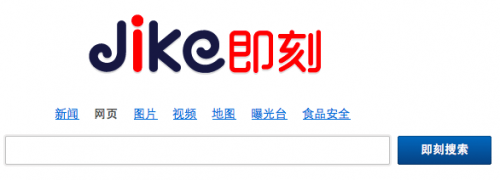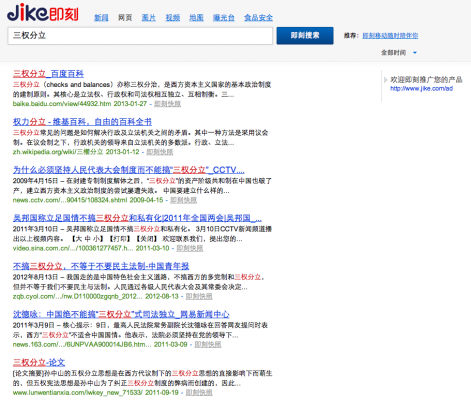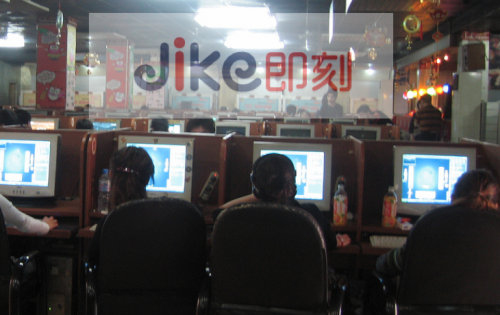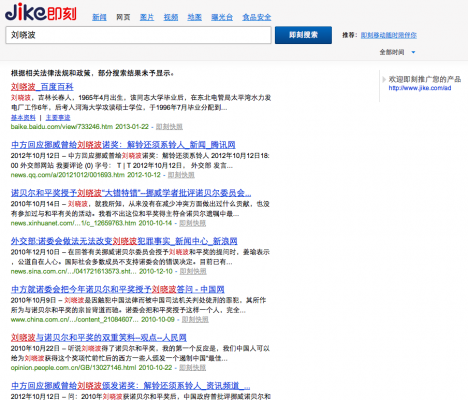Imagine waking up one morning with a nagging compulsion to understand ideas that up to now have been entirely alien to you — concepts like democracy, freedom of speech or separation of powers. Perhaps, the night previous, there were whispers at the next table about a man named “Liu Xiaobo” who harbored “dangerous” ideas of this sort. Liu who?
But, pshaw!, how dangerous can ideas really be?
You reach over to the bedside table and grab your mobile, knowing full well (as an internet literate Chinese “netizen”) that the answers are at your fingertips thanks to the miracle of search engine technology.
Let’s say, for the purposes of this story, that your first gateway to knowledge and discovery looks like this:

Jike.com is a state-controlled search engine launched in 2010 by the People’s Daily, the official newspaper of the Chinese Communist Party, and its listed internet arm, People’s Daily Online. (You’re not aware of this, but Kai-Fu Lee, the former president of China operations for Google.com, the world’s leading search engine service, had his social media account blocked a few days earlier after making unfavorable remarks about Jike.com and its president, former Chinese table tennis champion Deng Yaping.)
With a slight blush of guilt you enter your first search term: “separation of powers” (三权分立). Your results come back instantly.

The results are topped by the usual basics offered by the encyclopedia service at Baidu.com, Baidu Baike (百度百科), and the Chinese version of Wikipedia. These give you some decent background on the basic concept. But the meatier results that follow explain why “separation of powers” is a terrible idea for China.
First, there’s an April 2009 piece from the official China Central Television under the marathon headline, “Why We Must Cleave to the National People’s Congress System and Must Not Do ‘Separation of Powers'” (为什么必须坚持人民代表大会制度而不能搞“三权分立”). The piece offers a lengthy historical reading of China’s “unique situation” and how it is unsuited to Western political systems:
What political system a country implements is ultimately decided by that country’s national circumstances and nature. The democracy talked about in capitalist societies is bourgeois democracy, a democracy that in fact monopolizes capital, no more than multi-party elections, separation of powers and a bicameral system. The national people’s congress system in practice in our country is a people’s democratic system under the leadership of the Chinese Communist Party. We cannot put that Western system [into practice].
That sounds reasonable enough. Every country is different, right? You have to do things your own way. The monopolization of capital — how can that be fair?
But this is just one view, and your natural skepticism bids you on. You turn to the next search result, a video from March 2011 in which Wu Bangguo (吴邦国), a senior Party leader and then secretary of the Standing Committee of the National People’s Congress, says categorically that separation of powers and privatization of property are off the table for China because they are not, again, suited to its “unique circumstances.”
The next result, an article from China Youth Daily, published by the Communist Youth League of China, reassures you that while your country will not practice separation of powers, “democracy” remains a priority. An interview with a senior Party official from Hunan province, the article (“Not Doing Separation of Powers Does Not Mean Not Doing Democracy and Rule of Law“) argues that “the people decide on major matters through the people’s congresses at various levels and their standing committees.”

[ABOVE: A Chinese internet cafe superimposed with Jike.com search logo. Photo by Kai Hendry posted to Flickr.com under Creative Commons license.]
This article furrows your brow. You’ve never voted for a single people’s congress delegate, and everybody knows they’re appointed by Party officials. Where do the people come in at all? This local official must be pulling your leg. You’re better off drawing your wisdom from the “center,” from the senior levels, where officials are kinder and more mindful of the people’s needs than entrenched local tyrants like the one who demolished your uncle’s house to build another shopping mall.
Fortunately, just a few search results down — after an article about Hong Kong tycoon Li Ka-Shing and “separation of powers” within his family — there is an article from the “theory” section of People’s Daily Online. Its original source is the Party’s official People’s Daily. That should give you a more “central” perspective on this concept.
The article, “There are Fundamental Differences Between the ‘Separation of Powers’ System and the National People’s Congress System” (人民代表大会制度与“三权分立”制度有根本区别), begins with refreshing straightforwardness, cutting straight to its core point:
In order to gain a clear understanding of why we must keep to the people’s congress system and not do ‘separation of powers,’ the problem we first come to is one of how to understand freedom, democracy and human rights.
And, once again, you come up against this irresistible point about cultural relativism:
Under different historical circumstances, in different countries, in different ethnic groups, in different classes, understandings of these problems [of freedom, democracy and human rights] are different.
Well, that must be true, no? Chinese are not Westerners, after all. And the other way around. They eat beefsteaks on separate dinner plates and separate their powers. We keep our powers all mixed together, like Sichuan hot pot.
Scrolling through other pages of search results, you notice most are papers, or lunwen (论文), of a theoretical nature, the majority from official sources or journals. It’s time to move on.
You plug “Liu Xiaobo” (刘晓波) into Jike.com. Who is this guy anyway?

It becomes instantly clear to you that Liu Xiaobo isn’t just dangerous, he’s a convicted criminal, according to result after result thrown up by the Jike.com search engine.
The first news article result, directly from China’s Ministry of Foreign Affairs, is a response to the awarding of the Nobel Peace Prize to this man, which was “an interference in China’s internal affairs.”
The next result, from China’s official Xinhua News Service, vehemently attacks the Nobel Committee, saying that “the awarding of the 2010 Nobel Peace Prize to Liu Xiaobo is absolutely wrong.”
Up next is a People’s Daily article re-run by Sina.com, that says “the actions of the Nobel Committee cannot erase the fact of Liu Xiaobo’s crimes.”
Wait. There is no mention of what those crimes were. . . You scroll through several pages of search results. There are more articles, the bulk from People’s Daily online, labeling the Nobel decision a “mistake” and a “joke.”
Something’s not right. You’re on page 10 of the search results and still you can find nothing but one-sided recriminations. There’s a Xinhua News Agency article saying Malaysian media have called the Liu Xiaobo Nobel decision a “mistaken choice,” but it cites only one Malaysian newspaper. That’s a bit dirty. And there’s an article from the official government website in Tibet calling both Liu Xiaobo and the Dalai Lama “political games of the West.”
There are endless repeats of the response from the foreign ministry. . . But there has to be more.
Now curious about search engines and their limitations, you search Jike.com to learn more. You eventually stumble across this Chinese Wikipedia entry. It mentions that Google.com is currently the world’s leader in the search engine sector. Well, that should give you something.

You plug in “Liu Xiaobo” and suddenly the results look very different. There are news reports and in-depth features from Hong Kong media such as Ming Pao and Apple Daily. There are whole collections available online of Liu’s essays. There are open calls for his release. Even the President of Taiwan, Ma Ying-jeou, is talking about his case as an injustice.
Knowing full well that bias can work both ways, you search for the Jike.com results through Google. You add the search term “Ministry of Foreign Affairs” to “Liu Xiaobo” (刘晓波 + 外交部) and right away you get the foreign ministry’s official statement saying the awarding of the Nobel Peace Prize to Liu Xiaobo is an “interference in China internal affairs.”
That seems fair. You add Google to your favorites.
Clearly, the first search engine was taking you for a ride. Someone was playing political ping-pong with your search results. For the first and last time, you were Jiked.




















